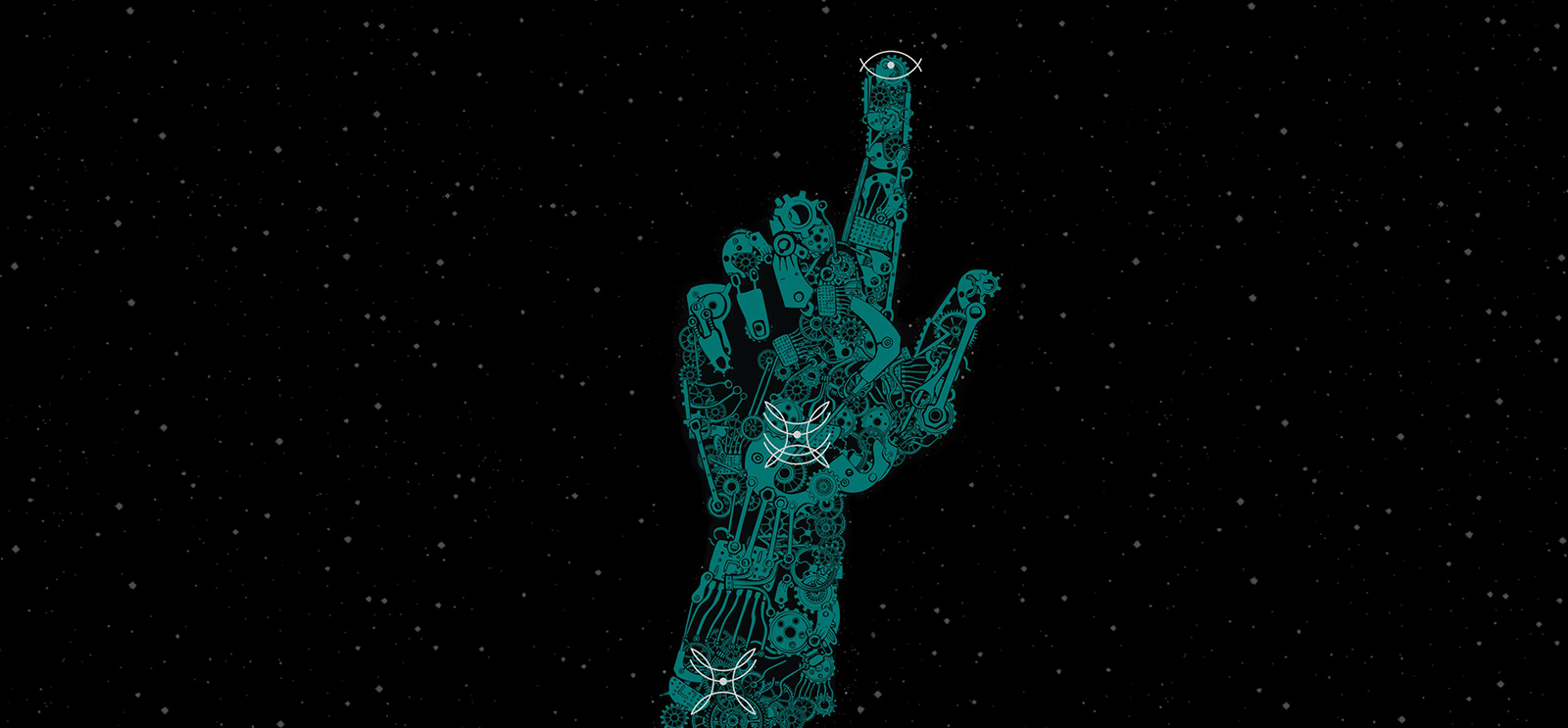
Sylvain Neuvel’s debut novel follows a worldwide effort to reassemble a giant, mysterious robot. (Book cover art courtesy Del Rey)
Science fiction author Sylvain Neuvel’s own story is out of this world.
It started with an offer to build a toy robot for his son. Sylvain Neuvel, PhD’03, had already handed down his love of all things science fiction and expected the young boy would simply say yes to a new action figure and continue watching television. Instead Neuvel got a barrage of questions, “like what kind of robot, where was it from, what does it do, are there people in it,” he recalls. His son’s questions, and an anime show about a robot from outer space, got Neuvel thinking—and writing.
The resulting book and Neuvel’s debut novel, Sleeping Giants (Del Rey, 2016), is about a massive top-secret effort, led by a University of Chicago physicist, to unearth and reassemble a giant thousands-years-old robot. Told mostly through journal entries and transcripts of interviews with an unnamed interrogator, the story follows a cast of scientists, soldiers, and government officials as they work to answer the same questions Neuvel’s son had asked: Where is it from? What does it do? And most important, what’s it for?
Neuvel finished the novel, then called The Themis Files, at the end of 2013. After about six months of fruitlessly trying to find a book agent he decided to self-publish, but he wanted a quote from a reviewer to put on the novel’s cover. So he sent a copy to Kirkus Reviews, a prominent publishing industry magazine. He worried Kirkus would pan the book, “but I thought I probably could at least squeeze one line out of context, you know, like ‘… book.—Kirkus Reviews.’”
But the reviewer loved it, calling the novel “a page-turner of the highest order” and giving it a coveted star. The day after the review went live on Kirkus’s website, Neuvel got a call from a Hollywood movie producer (“Well, email first, but it sounds better if you say ‘call,’” says Neuvel). A few days after that he had a movie agent, and then a book agent. A month later book rights to Sleeping Giants had sold at auction to Del Rey, an imprint of Random House, for six figures. Movie rights have since been optioned by Sony, and David Koepp (Mission: Impossible, Jurassic Park) has finished writing the screenplay.
It was the craziest time of his life, says Neuvel—a life that hadn’t exactly been conventional before. In high school he was talented but bored, so he dropped out at 15 and started working as a journalist for local newspapers near his Quebec hometown. “I don’t know how my parents let me do that, it was too early,” he says. For the next 10 years he “did just about every job you can think of,” from construction to scooping ice cream to selling furniture, and traveled extensively throughout Canada and the United States.
He enjoyed the traveling and (most of) his jobs but eventually grew tired of meager salaries and decided to go back to school. He chose to study linguistics, blending his interests in science and language, and finished his bachelor’s degree in two and a half years at the University of Montreal. Four years later he received his PhD from UChicago, where he focused on computer-aided morphology and linguistical analysis.
Today Neuvel runs a translation agency and works as a software engineer in Montreal. He’s finishing a Sleeping Giants sequel for Del Rey and continues to build sci-fi–themed toys for his son—a homemade set of Sleeping Giants Legos recently became more popular than Star Wars Legos in the Neuvel household, a major coup.
Like his son, Neuvel grew up watching Star Wars and Star Trek. His office at the translation agency is filled with evidence of decades of sci-fi fandom; a life-sized Darth Vader and a giant robot flank his desk, and action figures abound. He got interested in science fiction as a kid from looking up at the sky and being filled with a sense of wonder and possibility—which hasn’t gone away. “One of the great things about living in our era is that if you look up at the sky at the right time, the brightest thing you can see is man-made—it’s the [International] Space Station,” he says. “Folks can just look up and can say look, we went there, that’s us,” and imagine going farther.
For Neuvel, science fiction appeals to wanderlust on a cosmic scale. “I like the idea that we can be a lot more than what we are now. We can travel and see places and meet people,” he says—“if people they are.”
